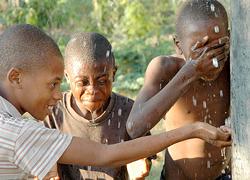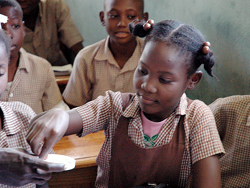
Imagine a world where infants and children didn’t die from diarrhea and typhoid before the age of five years-old. News headlines would not read, “Cholera Outbreak in Haiti Takes Thousands of Lives”. Girls could go to school all four weeks of the month, without worrying about hygiene issues. Envision a world where poverty and malnourishment didn’t claim innocent lives every day. You just visualized a world with access to safe drinking water and improved sanitation systems for all people.
On World Water Day 2010, Secretary of State Hillary Clinton rendered a tremendously powerful speech on the impact of clean water on public health, economic development, and capacity building. Clinton said, “It’s not every day you find an issue where effective diplomacy and development will allow you to save millions of lives, feed the hungry, empower women, advance our national security interests, protect the environment…Water is that issue”.
The United States government passed the Paul Simon Water for the Poor Act (WPA) in 2005. It stipulates that the U.S. government will make access to clean safe water and sanitation a policy objective in foreign assistance programs.
The WPA initiative is ambitious. The goal is to bring water and sanitation to 100 million people. The Senate passed the WPA unanimously on November 16, 2005, but there is still resistance in the House of Representatives to pass the Act.
WPA requires that the Secretary of State and the United States Agency for International Development (USAID) present annual progress reports to Congress annually that detail the strategic efforts by the U.S. to meet the objectives outlined in the WPA. The WPA is particularly significant because it calls upon cooperation between the public and private sector in program implementation.
Jim Thebaut is the C.E.O and Executive Producer of The Chronicles Group. Thebaut produced the documentary Running Dry which was presented world-wide and on Capitol Hill. Running Dry was the catalyst for Paul Simon’s WPA.
In a telephone interview, Thebaut told WaterWideWeb, “The WPA is important for moral and international security reasons because it presents an opportunity to bring water and sanitation to 100 million people”.
Thebaut has also produced the documentary Running Dry: Beyond the Brink , a preview film that was shown to the U.S. Department of State, the Capitol Hill Visitor Centre, and the United Nations High Level Conference on Sanitation and Global Health, earlier this year. “The U.S. can’t allow for crises like the cholera outbreak in Haiti to occur especially when we have the capacity to prevent them”.
Please watch the preview of Running Dry: On the Brink here
In Thebaut’s documentary Running Dry, he illustrates the connection between inadequate water access and terrorism. “When people feel desperate, and a group offers them basic necessities like water in an area where they don’t have any, recruitment for terrorism is more likely” concluded Thebaut.
The international community is working toward fulfilling the Millennium Development Goals (MDGs) by 2015. But, are governments and organizations planning properly for the time that follows these landmark goals? Will sanitation systems and clean water programs be established to address the global water crisis and other effects of global climate change?
Initiatives like the WPA are necessary endeavors by the U.S. government to meet the MDGs by 2015. Moreover, the WPA and policies like it are opportunities for the U.S. to demonstrate diplomacy and respect for human rights. Providing clean water access to 100 million people is a lofty goal by the U.S. that must be tackled systematically.
If U.S. dollars were spent on sustainable water programs, funding allocated to aid relief in the developing world would decrease over time. Fewer dollars would be spent on relief efforts that temporarily mitigate the immediate effects of systemic inequities and infrastructural incapacities in the developing world.
Statistics on water-related diseases, infant mortality, and hours lost to women gathering water for their families are symptoms of the global water crisis. These symptoms undermine the undeniable problem of inadequate water access and faulty sanitation systems.
What if farmers could rely on yearly crops instead of worrying about droughts, floods and water disasters? What if mothers could abandon the worry that their young daughters are being raped or assaulted on the long stretches to fetch water? What if diplomacy was exemplified without brandishing guns and weapons, but supplying a community with fresh water? Indeed, diplomacy and U.S. foreign policy would look very different if international security concerns were resolved with the provision of clean water.
Please read the 2009 progress report for the Water for the Poor Act here
What are your thoughts on water and diplomacy?
What are symptoms of the global water crisis that you recognize as most problematic for the international community?
If you enjoyed this article, you should also read:
The Politics of Water in Australia
Repairing Wells in Africa When the Water Runs Dry



Your Comments
4 Comments so far